Music Guild Meeting on Diversity in Theater Shows How Much Work There is To Do
Three of the buzziest buzzwords nationwide now are diversity, equity and inclusion. Everyone it seems wants to do better in those key areas (be it in their workplace, nonprofit or volunteer organization), and that includes the Quad-Cities theater community.
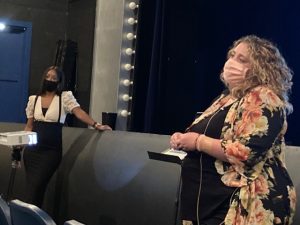
Sasha Trice, left, and Katherine Zerull were professional facilitators for the Saturday forum on how to improve theater diversity.
Thanks to a Quad City Arts grant and two professional facilitators, the 73-year-old Quad City Music Guild hosted a 90-minute discussion on these issues Saturday at the Prospect Park theater in Moline – led by the quote: “The beauty of the world lies in the diversity of its people.” It was attended by about 45 people (fewer than 10 of whom were people of color), representing leadership of a handful of local theaters – Music Guild, Spotlight, Playcrafters, Black Box and Richmond Hill. One revealing fact emerged Saturday is that just two Q-C theaters (of about a dozen) have a person of color on its board – Playcrafters and Countryside Community Theatre.
Nichole Collins Payney, an African-American design director and actress, said that every theater should have at least one person of color (and it doesn’t have to be African-American) on their board. Theaters should do better marketing and outreach to spread the word for people of color to get involved, she said. Collins Payney also was upset that the Saturday meeting was not better promoted.
Another person of color — Cindy Ramos — serves on the board of Countryside Community Theatre.
One of the discussion leaders, Sasha Trice (who is Black), a licensed mental health therapist, asked if local theaters are welcoming and
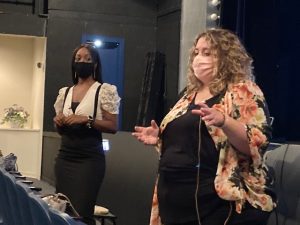
Sasha Trice, left, and Katherine Zerull led the Oct. 23 discussion on diversity at the Music Guild theater in Moline.
recruiting people of color, including boards and decision makers, cast and crew, and playwrights – and how they’d be rated on a scale of 1-100. “You have to market, you have to recruit, to have people of color represented,” she said. Whitewashing means that if a play calls for people of color, and no one fills those roles, Trice said. “If so, that takes away from an opportunity that a person of color could have had.”
She asked what rating local theaters would get in diverse casting, programming, board members, theater staff, number of plays by writers of color, and number of decision makers who are people of color. “And are you OK with that?” Trice asked. “People of color, we are always fighting for that seat at the table, where our voices can be heard, so we can have representation. But think about how game-changing it would be if we were invited to the table.”
Collins Payney, who was one of the “Little Shop of Horrors” street urchins (a three-member female chorus) in a 1988 Circa ’21 production, said she never saw a casting call for the recent Spotlight Theatre version (which cast three white women because no African-Americans auditioned). “That’s a huge problem,” she said. “We
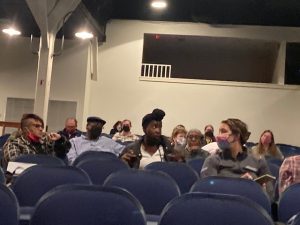
Some of the people in attendance at Saturday morning’s meeting on theater diversity, equity and inclusion.
need help as a theater community to break out of our bubble.”
Kayla Sierra-Lee, a white sound designer who’s worked at several area theaters, said every Q-C theater currently would fail the diversity rating.
“It’s really disheartening,” she said, noting Circa this past summer did the musical “Beehive,” which is typically a racially diverse cast of six women. Circa had two women of color in the show. “I’m, to be honest, really tired of a lot of the theaters in the Quad-Cities making these excuses. You did the bare minimum. The Quad-Cities has such a diverse community of people of color. We’re not reaching out to a diverse population; we’re reaching out to a white population in the Quad-Cities, and that’s just a fact. We are re-casting the same people. We’re not taking the steps to branch out.”
“We’ve done so many productions in the Quad-Cities that should have been diversified casts and they weren’t,” Sierra-Lee said. “Let’s move forward and figure out how to do this together and not get defensive about, well we’ve done this. Just say that it’s not enough. Let’s just accept that, guys.”
Shellie Moore Guy, an African-American poet, storyteller and speaker, was involved in Playcrafters’ 2008 diversity initiative, which pledged to do a Black production every year for three years (more have been done since). She was disappointed that other local companies didn’t
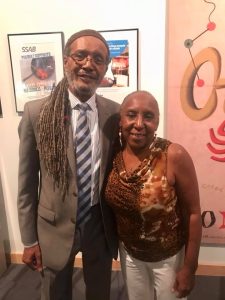
Shellie Moore Guy with Nate Lawrence, in 2019.
follow suit.
“No one was challenged,” Moore Guy said of other theaters that didn’t enhance their diversity of programming and performers. “I hear constantly, ‘We don’t know what we don’t know. We don’t know how to do it.’ We’re talking about otherwise intelligent individuals who don’t know how to do that. As long as you can get away without changing, then you don’t have to change. If there’s only a few Black people talking about it, we’re on the outside anyway, so we don’t have the power.”
“This is an important day; this is an important conversation today,” she said Saturday. “If you all, who run these companies, cannot admit that you’ve done nothing – without saying we don’t know. We have to be on the same page. “We just didn’t do it’ – that’s what you say. And what we hear all the time is, they just didn’t
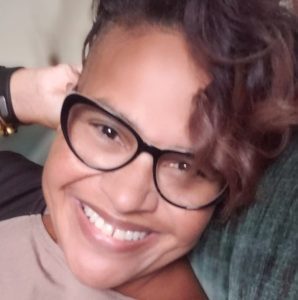
Nichole Collins Payney was in the Circa ’21 production of “Little Shop of Horrors” in 1988.
show up. You’re still saying that in 2021? You just have to give it up and say, ‘We haven’t done it’.”
Sara Tubbs, co-owner of the three-year-old Spotlight, agreed that announcing auditions on Facebook and other social media isn’t enough, and there should be a database of contact information for a diverse population in the area who’d be interested in getting the announcements, and knowing what is available. “How do we move forward together as a community?” Tubbs said. Black Box co-owner Lora Adams also asked for better contact information for people of color in local theater.
“The problem is that, we want there to be a follow-up,” Katherine Zerull (a licensed clinical social worker and other facilitator) said. “There’s so much important things to be discussed, as evidenced by all the things that have been brought up today. I don’t have something today that, in December we’re coming back and meeting again.”
“We need to continue to have these conversations,” she said. “It should have started a long time ago.”
Guild started two years ago
In March 2021, QCMG received a Capacity Building Grant from Quad City Arts to fund this diversity project’s first steps. The organization’s leadership attended professional training earlier this year, which focused on building diversity initiatives for Music Guild.
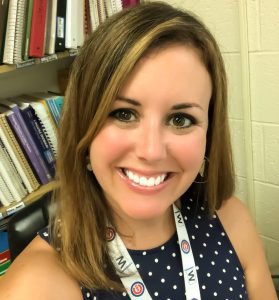
Jen Sondgeroth is board president of Quad City Music Guild.
Board president Jennifer Sondgeroth said recently that in 2019, Guild did a comprehensive Strategic Planning Process (funded by grants from Quad City Arts and Quad Cities Community Foundation), which identified goals and action steps for the next 3-5 years. Over 1,000 stakeholders (patrons, volunteers, etc.) participated in the process and provided input through surveys, focus groups and committees.
“It was really amazing and humbling to see,” Sondgeroth (a veteran actress herself) said. “People were very honest and vulnerable in sharing what they love about QCMG and what needs to change to move the organization forward. I’m so grateful. The plan was finalized and board approved in January 2020.”
One focus of the strategic plan is increasing the level of meaningful and sustained outreach to diverse populations within our community. “While QCMG is open to all members of our community, it is obvious that the makeup of our volunteers and patrons does not reflect the makeup of our community as a whole,” she said. “We identified this as a glaring organizational need. It was clear, through our process, that prior attempts to reach out to marginalized and under-represented groups have been project-based and short term, which has caused pain. We knew we had to get to work.”
“As with everything, the pandemic slowed us down, but it didn’t stop our work,” Sondgeroth said. “We had tough but meaningful conversations with members of our community who were willing to share their experiences. Katherine attended an online anti-racist directing training and shared that with the board. We did what we could while limited by the pandemic. We did know, with a return to
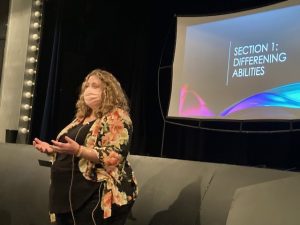
Katherine Zerull is a licensed clinical social worker, who’s also performed in Q-C musical theater and is a board member for Music Guild.
performances and ticket sales uncertain, that we would need grant funding to move forward as immediately as we wanted to with more formal efforts.”
QCMG received a $2,500 Quad City Arts Capacity Building Grant, which funded training for QCMG organizational leadership, that took place this past spring and focused on building an inclusive community, identifying challenges leading to feelings of exclusion by members of our community, and building a plan for long-term outreach, engagement, and inclusion of all members of our community. They plan to budget for additional training in 2022.
Guild’s goal is “to build and maintain a community theatre that is overtly inclusive and representative of all facets of our rich and diverse community.,” Sondgeroth said before Saturday’s meeting. “I know things won’t magically be solved on October 23, but it is a needed first step. I know that inclusivity and representation aren’t concerns that can be ‘fixed’ with a couple of events. It isn’t something we can check off the list and call done.
“Meaningful inclusion isn’t just about inviting people to auditions,” she said. “It’s about providing access. Making space. Building trust. That takes time. It will need to be an ongoing effort and priority. I know there will be missteps and mistakes along the way – but that is where learning and growth and progress happen. We’re committed to doing that work.”

Sasha Trice, left, and Katherine Zerull led the Oct. 23 discussion on diversity at the Music Guild theater in Moline.
Christina Myatt, a veteran director/choreographer and actress who was there Saturday, said this conversation is going on all across our country in arts organizations.
“As an organization, one must constantly look at what we are doing well and where we could make improvements,” she said of Music Guild and others (she’s owner/artistic director of Center Stage Performing Arts Academy). “Equity, inclusion, and diversity are places where Guild has had missteps. We own those things and are committed to providing opportunities which are accessible and inviting to all.
“These decisions are difficult,” Myatt said. “Shows we might like to see produced at Guild are not always possible with those we currently see at auditions. That is not to say that efforts have not been made by Guild and other theatres to reach out to the community. But those efforts have not produced the results we would have liked. This is why we wanted to have these conversations.
“It is apparent to us (and to the arts community as a whole) that what we think we are doing is not enough,” she said. “This initiative is not to point fingers or to point out past mistakes. It is about creating meaningful dialogue and then instituting change. It is not a quick fix or an attempt to satisfy the need of a particular show. We are dedicated to creating an environment where all members of our community feel comfortable and feel accepted and valued based on the things we have in common and not valued because of a particular ‘need’ of a show.”
“While QCMG is open to all members of our community, it is obvious that the makeup of our participants and patrons does not reflect the makeup of our community as a whole,” said a release from Music Guild. “Previous attempts at outreach to under-represented and marginalized groups have been minimal, project-based and short term.
“We identify this as an organizational weakness, acknowledge that it has caused pain within our community, and have developed a plan to build organizational capacity by beginning to move towards sustained and meaningful outreach to and representation/engagement of all members of our community,” they said.
Showing how arts have embraced diversity
Zerull and Trice on Saturday led participants through a video presentation that defined essential terms (including diversity, representation, intersectionality, whitewashing and white privilege), and showed inspiring examples of how Broadway, the ballet world, and television are
doing better at diversity, equity and inclusion. They displayed clips of musical theater actress Ali Stroker (paralyzed and in a wheelchair since age 2), who was the first disabled person to win a Tony – for “Oklahoma!” in 2019; companies that make colored pointe shoes that are appropriate for dancers of color, and an impassioned 2015 speech from Emmy-winning actress Viola Davis, who is Black.
“The only thing that separates women of color from anyone else is opportunity. You cannot win an Emmy for roles that are simply not there,” she said then.
In the discussion on welcoming performers of differing abilities, Daniel Williams, a Music Guild veteran, noted the theater is not handicapped accessible for any performer, musician, or crew member. Another person mentioned that will be a challenge financially to make that happen.
“This is a really excellent thought,” Zerull said of addressing barriers. “If a theater is not built to have people of differing abilities participate fully – whether they want to be in the sound booth or on the stage….There are so many things to think about. So financially, that’s a huge barrier for so many people and so many organizations.”
“Change costs – whether it’s financial, emotional,” said Shellie Moore Guy, noting her mother used a wheelchair. “There are all of these costs that go along with change. You intentionally did not make this place handicapped-accessible.”

The lead image for the new Facebook group Diversity, Equity and Inclusion in the Arts – QC.
“We have to not let the barriers become excuses,” Zerull (who’s a QCMG board member) said. “We can’t sit idly by and say, it’s just not built that way. We have to figure out, how to make this better and different, and how do we make this accessible in the moment?” We also must ask the people with differing abilities how to improve and make the theater the best it can be, she said.
Christina Myatt posted in new Facebook group created out of Saturday’s meeting – Diversity, Equity and Inclusion in the Arts – QC (which already had 260 members as of Sunday):
“Does each group have a person of color on their board who has a say in what is being produced? How are people reaching out to diverse populations? In that discussion, people mentioned not knowing where to go to receive information about auditions, call for staffs, etc. It was
also mentioned that there should be a bank of emails that each theatre could add to their marketing to reach out to people of color.
“From that — an email was sent to all participants and those who were invited but could not attend. It included the link to this group as well as the links to other Facebook pages where people could find information about different organizations in our community. It also asked participants to share and invite others to be part of this community.
We did not get to everything that was planned because people needed to be able to speak their truths,” she wrote. “There will be follow-ups after this.
“This group was created specifically to be a response to something that was asked for by those present,” Myatt wrote of the Facebook group. “It is not meant to be an ending point but a starting point. I have already had people who have responded to the original email and have had persons of color who have offered to assist in
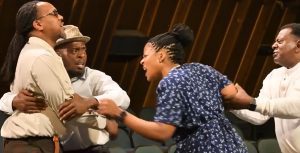
Playcrafters in Moline — which staged August Wilson’s “The Piano Lesson” this past July — launched a diversity initiative in 2008 and is the only Q-C theater with a person of color on its board of directors.
planning next steps.”
The QCMG board will meet on Tuesday and this is an agenda item, as well as an election for the next two-year terms for five board seats (out of 15 members on the board). “We hope that we (in conjunction with the other theatres and arts organizations in the area) can continue these conversations and act on some of the items that people have shared,” Myatt said.
Phil Cathoir posted on Facebook after the meeting:
“I like this concept but would like to see a better effort. Another group of the exact same people that are 95% Caucasian doesn’t do much for diversity. Adding churches and groups for minorities and linking them here and finding ways to include those groups, people who don’t traditionally see these posts would be great finding a way to let those member hear about things, black churches and organizations, Asian ones, Latino, I mean there are soooooo many organizations out there for diverse cultures, how about looking up sites and phone numbers for all of them and reaching out seeing about adding those members a group about diversity and sharing that is 95% white.
“To share so we can call it an attempt at being diverse again just feels like a way for white people pat themselves on the back without putting in any real effort to do so,” he wrote. “Hopefully this group sees more people of color join because looking through the members list like always it’s maybe 1 in 10 or 1 in 15 that are actually people of color, if this group reaches out and makes real connections with the community organizations out there and really tries to facilitate a way to connect with diverse group that would be great and hopefully see a lot more minorities join the group.”



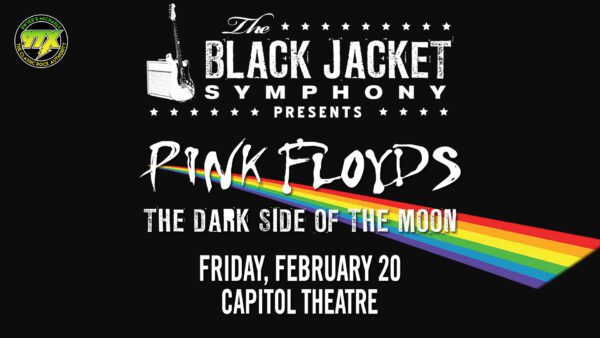
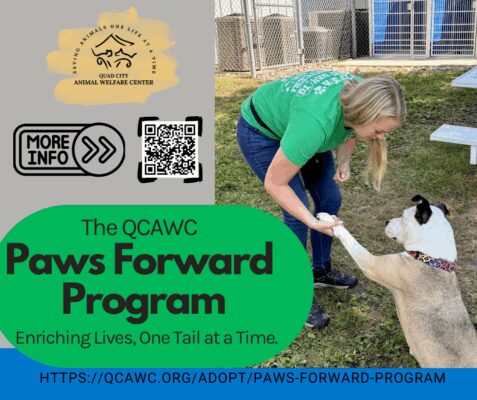








Leave a Reply
You must be logged in to post a comment.